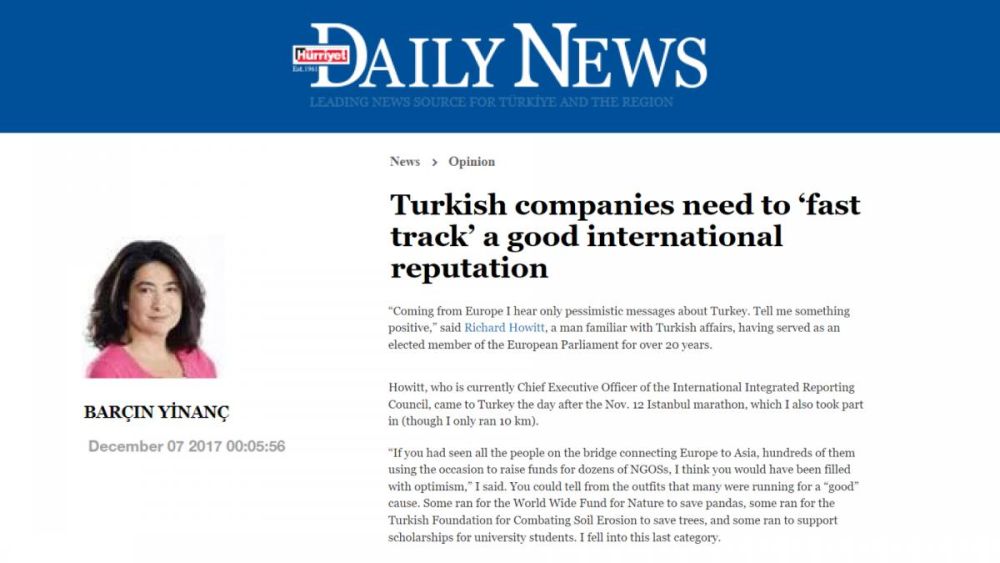Howitt, who is currently Chief Executive Officer of the International Integrated Reporting Council, came to Türkiye the day after the Nov. 12 Istanbul marathon, which I also took part in (though I only ran 10 km).
“If you had seen all the people on the bridge connecting Europe to Asia, hundreds of them using the occasion to raise funds for dozens of NGOs, I think you would have been filled with optimism,” I said. You could tell from the outfits that many were running for a “good” cause. Some ran for the World Wide Fund for Nature to save pandas, some ran for the Turkish Foundation for Combating Soil Erosion to save trees, and some ran to support scholarships for university students. I fell into this last category.
Howitt was also in Türkiye for a good cause: The promotion of “good business.”
“In many B20 meetings I have observed so much concern over the loss of trust in business,” said Howitt, referring to a group that specializes in G20 dialogue with the global business community.
It is easy to understand this loss of trust when we are constantly exposed to the dark side of the business world. His visit came a few days after the publication of the “Paradise Papers,” which revealed how the world’s biggest businesses stash their wealth in secretive tax havens.
If companies were to adopt the motto of “doing good is good business,” maybe this trend could be reversed.
That is why Howitt is spearheading the adoption of Integrated Reporting globally. He wants companies to shift from compliance-driven reporting to integrated reporting. Conventional reporting is too complex and too long, and no one wants to read it. The British postal service once refused to distribute HSBC’s reports because they were too big.
Integrated reporting takes up fewer than 150 pages and is written in a language that lay-people can understand, said Howitt.
The crucial factor is not the size of the report. In contrast to conventional reporting, integrated reporting takes into account intangible values such as Research and Development (R&D) works, social responsibility projects, human and intellectual capital.
“Integrated Reporting is an evolution of corporate reporting, with a focus on how an organization’s strategy, governance, performance, and prospects lead to the creation of value over the short, medium and long term,” said the founder of Argüden Governance Academy Dr. Yılmaz Argüden, who hosted Howitt in Türkiye.
“Integrated reporting is the result of integrated thinking, enabling a better understanding of the factors that materially affect an organization’s ability to create value over time by achieving strategic objectives through effective utilization of the financial, physical, intellectual, human, social and relationship, and natural resources. It is the panacea to transform short term, selfish capitalism into responsible capitalism,” said Dr. Argüden, who is also head of ARGE Consulting.
During Türkiye’s presidency of the G20 in 2015, the importance of Integrated Reporting was endorsed by the B20, thanks partly to the efforts of ARGE Consulting, then Knowledge Partner of the B20. “Türkiye played an important role in our history, I want Türkiye to play an important role in the future of our movement too,” said Howitt.
It is not a coincidence that BRICS economies represent some of the leading countries in terms of implementing Integrated Reporting. This is because the practice can help companies “fast track” a good international reputation, according to Howitt.
From the global perspective, Turkish business is a relatively “new kid in town.” Over the years Turkish companies have had to face several challenges to compete worldwide. Türkiye’s tarnished image abroad is not helping the country’s companies. Indeed, many suffer from a negative international perception. This being the case, integrated reporting will not only benefit Turkish businesses - it could also help “fast track” an international reputation.














